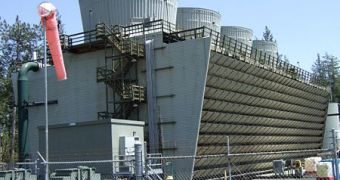The new geothermal plant that opened Thursday, November 6th, is the first modular plant of its kind, meaning that its building time only lasted for about 6 months. This is a very short term for such an undertaking, as regular thermal power plants usually take about 5 to 7 years to plan and build. Raser Technologies Inc., the company behind the project, says its plant will produce some 10MW of energy annually.
The modular design allowed for such short construction times. Basically, the plant will be expanded as the necessity occurs. Thus far, it is comprised of enough parts to last it some 35 years, according to the predictions of the company. By early 2009, the installation will be operating at full capacity, providing electricity to the nearby town of Anaheim.
Another plus of the new facility is its patented technology, which allows for the use of water previously deemed inappropriate for electricity-generating activities. The low-temperature technology, developed by UTC Power, will result in no carbon emissions whatsoever, or at least that is what the company says. This means that, if this project turns out to be feasible, the United States could see the appearance of multiple such modular geothermal plants in the near future.
Official government estimates say that the supply of hot water underneath the country's crust could fuel some 30-33 percent of the nation's needs, namely approximately 150,000 MW. These numbers will surely seem appealing to investors, who will try to make the best of Raser's new modular construction technology. The company announced that 7 new plants were currently under construction, all appointed to the Western US. Another modular facility is due to be shipped to Indonesia upon completion.
"Here in Utah we are blessed with some of the largest reserves of geothermal energy in the nation. We should be developing this clean renewable source of energy. The state of Utah applauds Raser's innovation that enables the commercial production of the important resource," says Lt. Governor Gary Herbert.

 14 DAY TRIAL //
14 DAY TRIAL //